新概念英语第二册语法介词课件(共72张PPT)
文档属性
| 名称 | 新概念英语第二册语法介词课件(共72张PPT) | 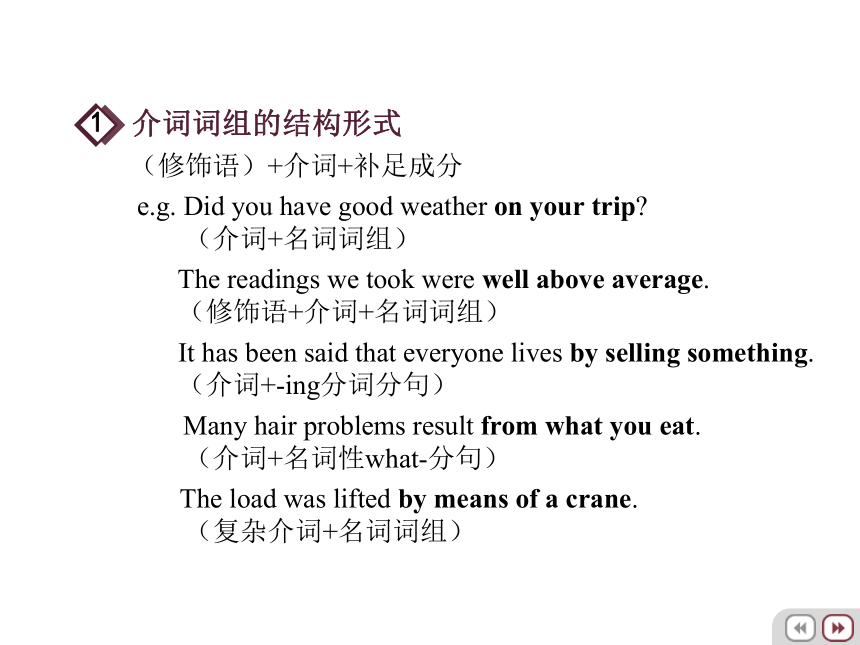 | |
| 格式 | pptx | ||
| 文件大小 | 1015.0KB | ||
| 资源类型 | 教案 | ||
| 版本资源 | 新概念英语 | ||
| 科目 | 英语 | ||
| 更新时间 | 2024-11-25 18:38:20 | ||
图片预览

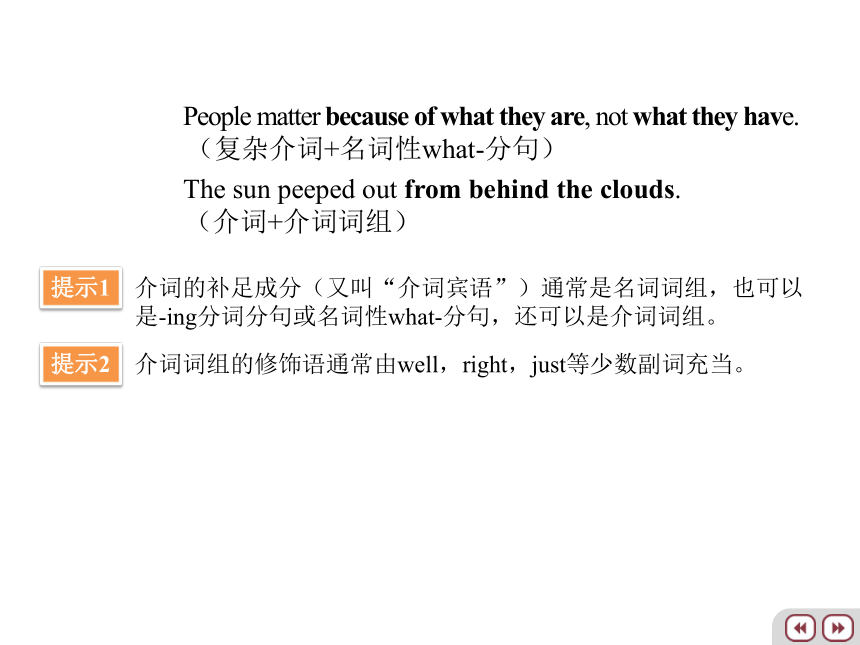
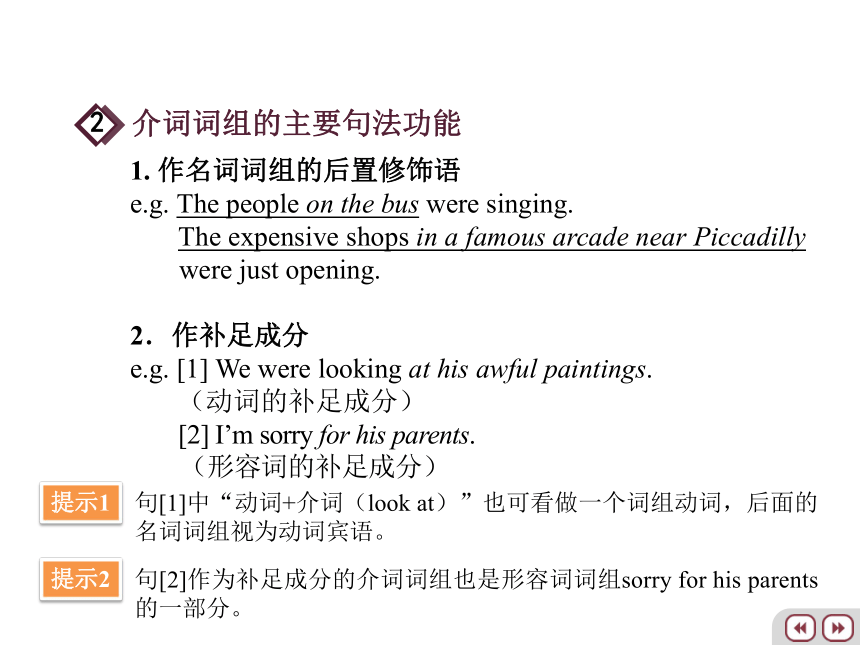
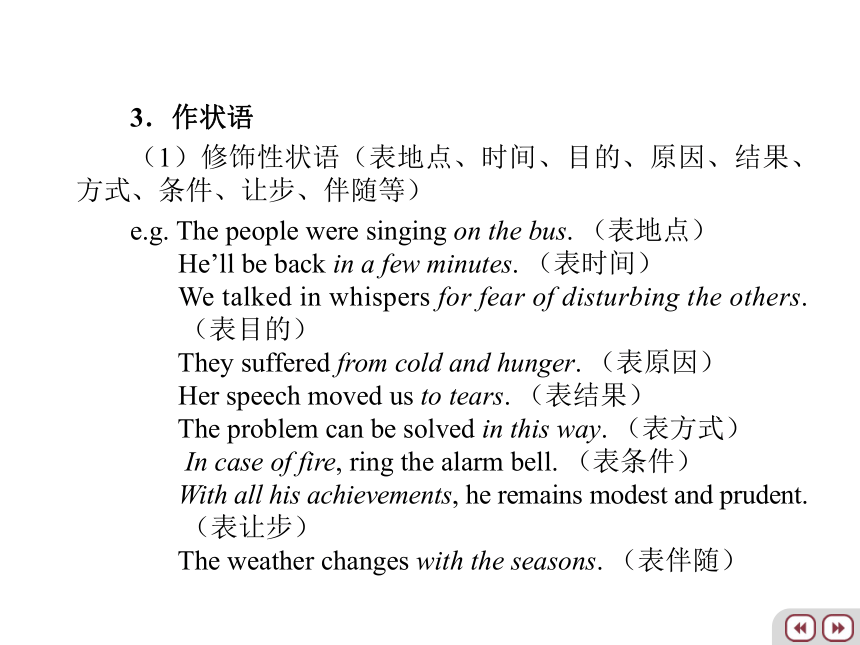
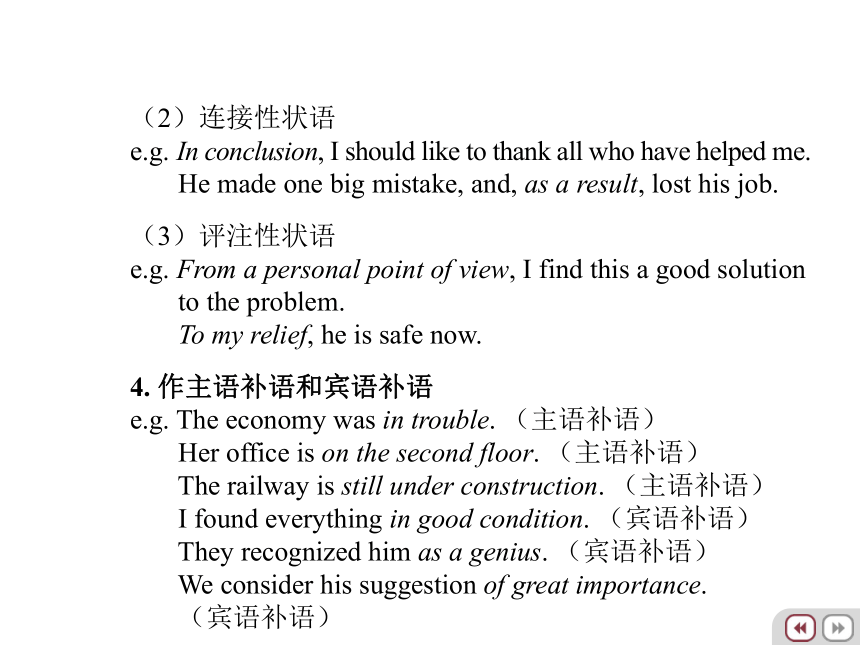
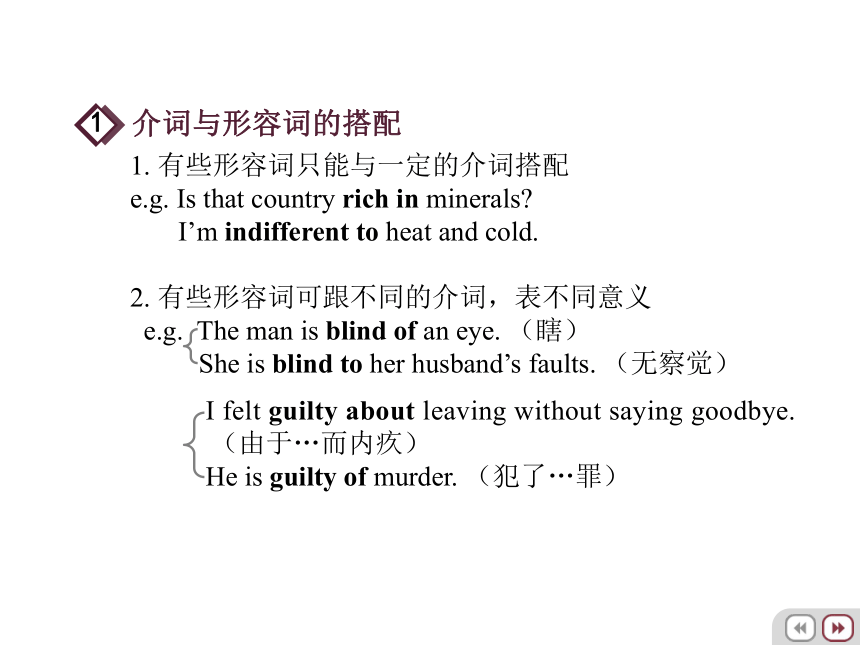

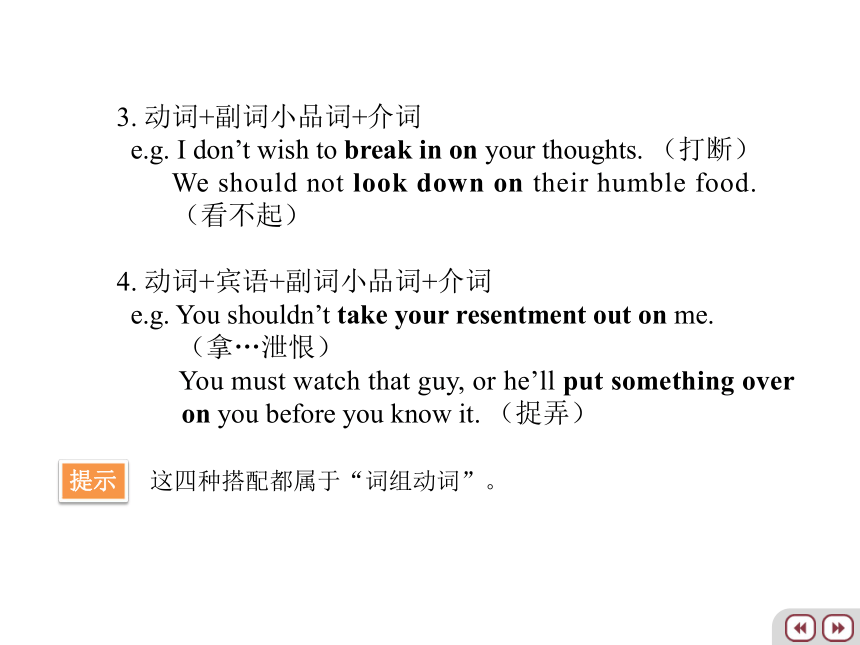
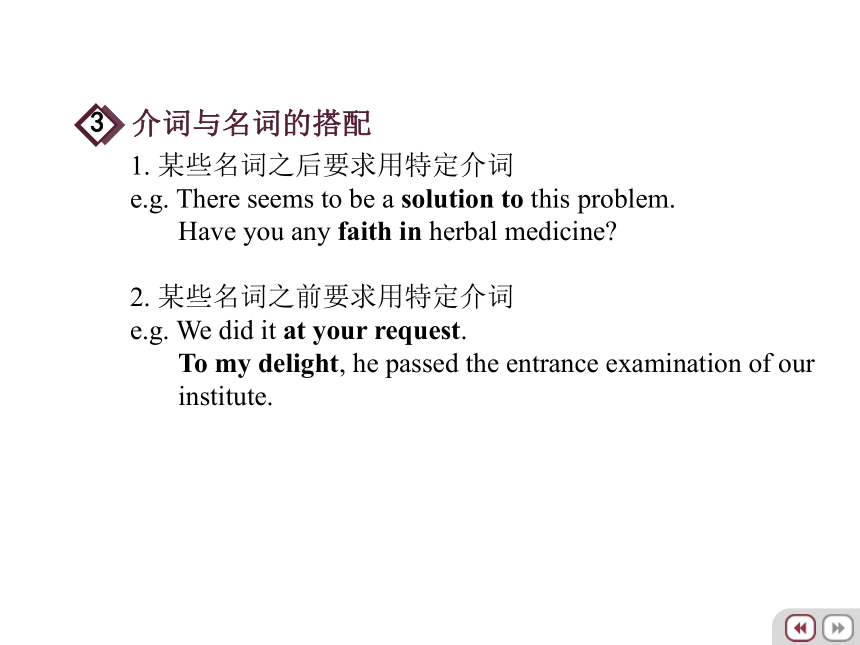
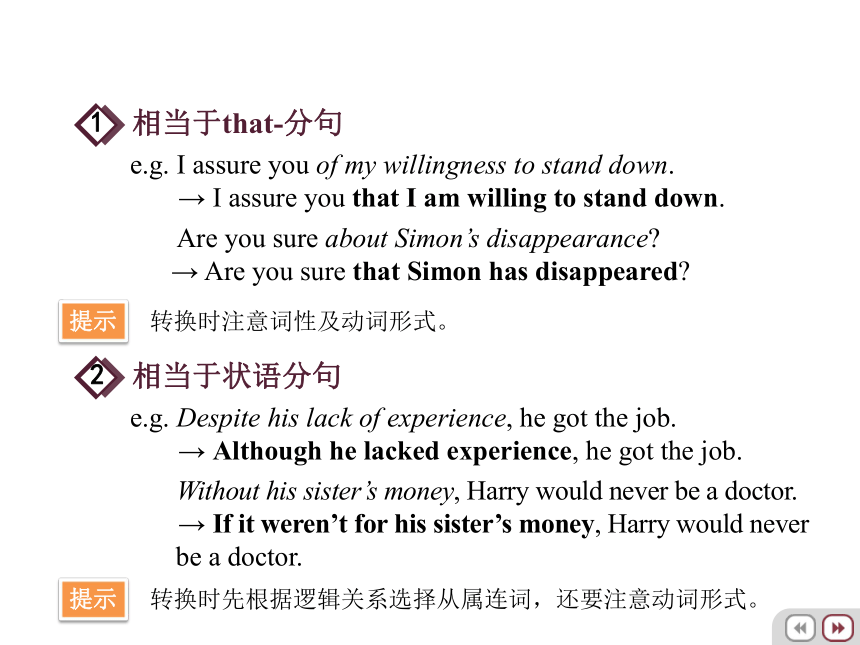
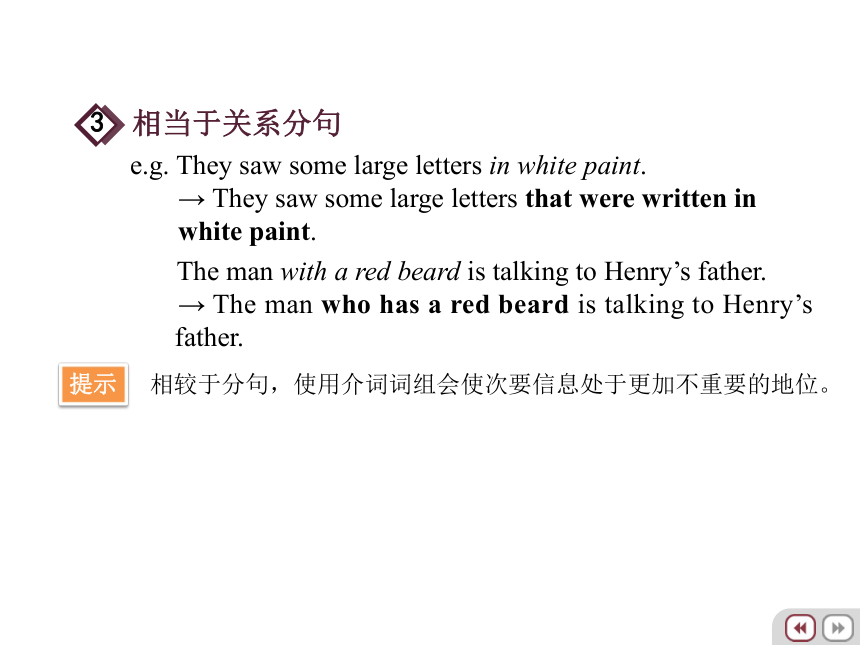
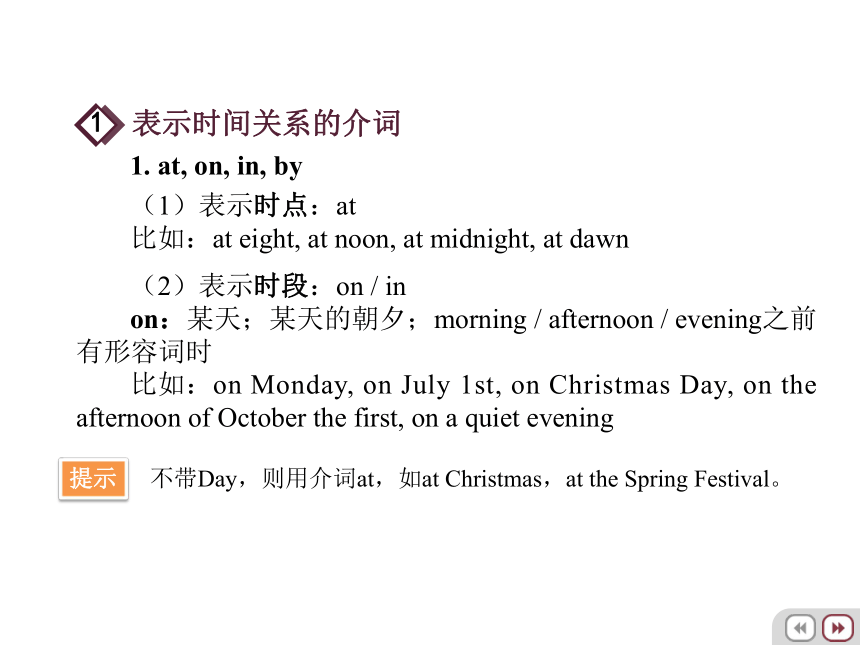
文档简介
(共72张PPT)
(修饰语)+介词+补足成分
e.g. Did you have good weather on your trip
(介词+名词词组)
The readings we took were well above average.
(修饰语+介词+名词词组)
It has been said that everyone lives by selling something.
(介词+-ing分词分句)
Many hair problems result from what you eat.
(介词+名词性what-分句)
The load was lifted by means of a crane.
(复杂介词+名词词组)
介词词组的结构形式
1
People matter because of what they are, not what they have.
(复杂介词+名词性what-分句)
The sun peeped out from behind the clouds.
(介词+介词词组)
介词的补足成分(又叫“介词宾语”)通常是名词词组,也可以是-ing分词分句或名词性what-分句,还可以是介词词组。
介词词组的修饰语通常由well,right,just等少数副词充当。
提示1
提示2
1. 作名词词组的后置修饰语
e.g. The people on the bus were singing.
The expensive shops in a famous arcade near Piccadilly
were just opening.
2.作补足成分
e.g. [1] We were looking at his awful paintings.
(动词的补足成分)
[2] I’m sorry for his parents.
(形容词的补足成分)
介词词组的主要句法功能
2
句[1]中“动词+介词(look at)”也可看做一个词组动词,后面的名词词组视为动词宾语。
句[2]作为补足成分的介词词组也是形容词词组sorry for his parents的一部分。
提示1
提示2
3.作状语
(1)修饰性状语(表地点、时间、目的、原因、结果、方式、条件、让步、伴随等)
e.g. The people were singing on the bus. (表地点)
He’ll be back in a few minutes. (表时间)
We talked in whispers for fear of disturbing the others.
(表目的)
They suffered from cold and hunger. (表原因)
Her speech moved us to tears. (表结果)
The problem can be solved in this way. (表方式)
In case of fire, ring the alarm bell. (表条件)
With all his achievements, he remains modest and prudent.
(表让步)
The weather changes with the seasons. (表伴随)
(2)连接性状语
e.g. In conclusion, I should like to thank all who have helped me.
He made one big mistake, and, as a result, lost his job.
(3)评注性状语
e.g. From a personal point of view, I find this a good solution
to the problem.
To my relief, he is safe now.
4. 作主语补语和宾语补语
e.g. The economy was in trouble. (主语补语)
Her office is on the second floor. (主语补语)
The railway is still under construction. (主语补语)
I found everything in good condition. (宾语补语)
They recognized him as a genius. (宾语补语)
We consider his suggestion of great importance.
(宾语补语)
1. 有些形容词只能与一定的介词搭配
e.g. Is that country rich in minerals
I’m indifferent to heat and cold.
2. 有些形容词可跟不同的介词,表不同意义
e.g. The man is blind of an eye. (瞎)
She is blind to her husband’s faults. (无察觉)
I felt guilty about leaving without saying goodbye.
(由于…而内疚)
He is guilty of murder. (犯了…罪)
介词与形容词的搭配
1
3. 有些形容词可跟不同的介词,表相同意义,搭配不同
e.g. He was disappointed at his marriage.
(补足成分指事)
He was disappointed with his new assistant.
(补足成分指人)
1. 动词+介词
e.g. He fell into the habit of not attending to other people’s
advice. (养成)
We concentrate on doing one job at a time.
2. 动词+宾语+介词
e.g. They excluded him from the club.
You should take advantage of this opportunity, for it
may not occur again.
介词与动词的搭配
2
3. 动词+副词小品词+介词
e.g. I don’t wish to break in on your thoughts. (打断)
We should not look down on their humble food.
(看不起)
4. 动词+宾语+副词小品词+介词
e.g. You shouldn’t take your resentment out on me.
(拿…泄恨)
You must watch that guy, or he’ll put something over
on you before you know it. (捉弄)
这四种搭配都属于“词组动词”。
提示
1. 某些名词之后要求用特定介词
e.g. There seems to be a solution to this problem.
Have you any faith in herbal medicine
2. 某些名词之前要求用特定介词
e.g. We did it at your request.
To my delight, he passed the entrance examination of our
institute.
介词与名词的搭配
3
e.g. I assure you of my willingness to stand down.
→ I assure you that I am willing to stand down.
Are you sure about Simon’s disappearance
→ Are you sure that Simon has disappeared
相当于that-分句
1
转换时注意词性及动词形式。
提示
转换时先根据逻辑关系选择从属连词,还要注意动词形式。
提示
e.g. Despite his lack of experience, he got the job.
→ Although he lacked experience, he got the job.
Without his sister’s money, Harry would never be a doctor.
→ If it weren’t for his sister’s money, Harry would never
be a doctor.
相当于状语分句
2
相较于分句,使用介词词组会使次要信息处于更加不重要的地位。
提示
e.g. They saw some large letters in white paint.
→ They saw some large letters that were written in
white paint.
The man with a red beard is talking to Henry’s father.
→ The man who has a red beard is talking to Henry’s
father.
相当于关系分句
3
1. at, on, in, by
(1)表示时点:at
比如:at eight, at noon, at midnight, at dawn
(2)表示时段:on / in
on:某天;某天的朝夕;morning / afternoon / evening之前有形容词时
比如:on Monday, on July 1st, on Christmas Day, on the afternoon of October the first, on a quiet evening
表示时间关系的介词
1
不带Day,则用介词at,如at Christmas,at the Spring Festival。
提示
in:长于或短于一天
比如:in a week, in summer, in 2021, in the twentieth century, in the morning
(3)表示到什么时间为止:by
比如:by 6 o’clock, by May 4, by lunchtime
in…有时表示“在…时间以内”,有时表示“在…时间以后”,前者如“I shall take a holiday in summer.”,后者如“I will be back in a week.”。
提示
带有by-词组的句子中,谓语动词有时要用完成体,如“By next summer he’ll have taken all those books.”。
提示
2. for, from, since, during
(1)笼统地表示一段时间:for
e.g. He travelled in the desert for six months.
He has worked here for a year.
(2)具体表示从何时到何时的一段时间:from … to / till / until
e.g. Most people work from nine to / till five.
From September until December, Congress remained
in session.
表一段时间的for有时可省略,在非正式语体中较常见,如“I’ve lived in this neighbourhood (for) a long time.”。
提示
(3)只讲终点时间,不讲起点时间:till / until
e.g. He didn’t get home till / until 2 o’clock.
They played bridge till midnight.
(4)只讲起点时间,不提终点时间:since
e.g. We’ve lived here since 2006.
That was years ago. I’ve changed jobs since then.
不能用to,比如不能说“*They played bridge to midnight.”。
提示
since即“from a time in the past until a later past time, or until now”,意为“自…以后;从…以来”,常与现在完成体或过去完成体连用。
“It is +若干时间+ since…”比“It has been +若干时间+ since…”更普通,如通常说“It is a year since his return / he returned.”,很少说“It has been a year since his return / he returned.”。
提示1
提示2
(5)表示具体的一段时间:during
e.g. He was ill for a week, and during that week he ate
nothing.
Several banks failed during the recession.
(6)表示“目的”:for
e.g. I went there for my holidays.
3. in, during, for表示时间的用法比较
(1)表示一段时间,凡是能用in的地方,一般均可用during
e.g. He called to see me during my absence.
You shouldn’t call on his wife in his absence.
(2)during更强调时间的延续,而in则只是一般指某一时间
e.g. They suffered hardships during the war.
They visited many factories during their stay in Shanghai.
Her husband was killed in the war.
(3)“in +时间名词”表示“在何时”,“for +时间名词”表示“有多久”
e.g. When did he stay there In the winter.
How long did he stay there For the winter.
(4)许多场合下for和during可交替使用,表示时间长度
e.g. We stayed in Shanghai during / for the remaining days
of the summer vacation.
在与visit,stay,meal等表示事态延续一定时间的名词搭配时,只能用during,不能用in。
提示
1. in, at
(1)表示具有一定幅员的地方:in
比如:in China, in a street, in a room, in a forest
(2)表示在一个点:at
比如:at a certain point, at the crossroads, at the bus stop
e.g. We stopped first at Shanghai, then at Tokyo on our way
to San Francisco.
表示空间关系的介词
2
国家、省和大陆都用in,不可用at。
提示
大城市和大城市的街区,通常用in,如in Shanghai,但当把它们看作地图上的一个点时,可用at。
商店、机关、学校等,看作一个地点时,用at;看作一个场所时,用in。如“He works at the post office.”“In the rain we were sheltering in the post office.”。
提示1
提示2
2. in, into, on, onto
(1)表示“在…之内”,常表示静止状态:in
表示“进入”,常表示运动状态:into
e.g. My family have lived in this house for generations.
Burglars broke into their home.
(2)表示“在…上”,既能用于静止状态,也能表示运 动状态:on
表示“到…上”,常表示一种运动状态:onto
e.g. He was sitting on his case. (静止状态)
The apple fell on the ground. (运动状态)
She stepped gracefully onto the stage. (运动状态)
Jenny threw herself onto the bed. (运动状态)
3. above, over
共性:表示“在…之上”、“高于”
e.g. The helicopter hovered above / over us.
(直升机在我们上空飞翔。)
The water came up above / over our knees.
(水没过了我们的膝盖。)
区别:
(1)表示“盖在上面”、“贴在上面”:over
e.g. He put a blanket over the sleeping child.
(2)表示一种垂直的关系:over
e.g. There was a lamp hanging over the table.
(3)表示从某物的一边移至另一边:over
e.g. They jumped over the stream.
(4)表示职位上“高于”,并有直接的隶属关系:over
e.g. He is over me. (他是我的顶头上司。)
仅表示职位上“高于”:above
e.g. He is above me. (他的职位比我高。)
(5)“多于”,与数目、年龄、金钱和时间连用:over
e.g. It costs over 100.
We waited over 2 hours.
(6)“高于”,与最低限度或某固定值连用:above
e.g. The temperature is three degrees above zero.
The mountain rises 6,000 feet above sea level.
She’s well above average in intelligence.
如果我们想到的刻度是竖的,是可以表示高低的,就用above。
提示
4. below, under, beneath
(1)表示紧贴在下面:under
e.g. She put the letter under her pillow.
(2)上下之间有个距离,并非紧贴在下:below
e.g. We live on the fourth floor. They live below us.
(3)表示职位上“低于”,并有直接的隶属关系:under
e.g. He is under me.
仅表示职位上“低于”:below
e.g. He is below me.
(4)多表示抽象意义:beneath
e.g. They thought she had married beneath her. (下嫁)
He considers such jobs beneath him. (有失他的身份)
5. beside, between, among, behind, in front of, opposite
(1)“在…旁边”:beside
e.g. Tom was sitting beside Mary.
(2)“在…之间”:between / among
between:两者之间;三者或三者以上之间,数目明确
among:在众多的人或物之间,无明确数目
e.g. Mary was sitting between Tom and Bob. (两者之间)
Switzerland lies between France, Germany, Italy and
Austria. (三者以上之间)
The food was shared between three families. (三者之间)
He lives in a village among the hills. (众多的物之间)
He left some money to be divided among the servants.
(众多的人之间)
介词besides表示“除了…以外”,相当于in addition to。
提示
(3)“在…之后”:behind
“在…之前”:in front of
e.g. Bob was sitting behind John and in front of Alice.
(4)“在…对面”:opposite
e.g. He stood opposite me.
The bank is opposite the supermarket.
between表示三者或三者以上之间时,强调各个个体之间的关系;不需将各个人或物作为独立个体看待而只将他/它们作一个整体看待时,就用among。
提示
in front of表示相对于参照物外的“前面”,而in the front of表示相对于参照物内部的“前面”,比如“He sat in the front of the classroom.
(教室内的前面)”。
提示
6. out / out of, outside / outside of, inside / inside of
(1)out of:既可表动向,也可表位置,意为“从…(里面)出去”、“在…之外”
out:只用于非正式语体,且只表外向的动作
e.g. She ran out of the house. (表示动向)
I spent long years out of England. (表示位置)
I threw it out the window. (非正式语体)
(2)outside / outside of:一般只表位置,意为“在…之外”
e.g. The cat sleeps outside / outside of the house.
(3)inside / inside of:一般只表位置,意为“在…之内”
inside:有时也可表动态,意为“向…之内”,相当于into
e.g. He parked his car inside / inside of the gate.
Don’t let the dog come inside the house.
outside of和inside of主要用于美式英语。
提示
比喻意义:在时间和空间概念基础上引申出的意义。
作用:使得句子表达更加简洁、地道、生动形象。
e.g.
[1a] The train arrived at the station 20 minutes late. (到达)
[1b] He arrived at the solution by a simple process of deduction.
(得出)
[2a] We were flying above the clouds. (在云层上面)
[2b] They consider themselves above criticism. (无可非议)
[3a] He went into the house. (进屋里)
[3b] He sank deeper into depression. (陷入消沉)
介词的比喻意义
3
[4a] She rose from the chair. (从椅子上)
[4b] She was released from her heavy responsibilities.
(卸去重任)
[5a] Stay close behind me. (在我后面)
[5b] She knew that, whatever she decided, her family was
right behind her. (支持她)
上述a句中的介词表达字面意义,b句表达比喻意义。
提示
①* I’ve been learning English since five years.
②* According to my opinion, animals shouldn’t be kept for fun.
③* Where were you in the afternoon of May 21
④* On next Saturday, I ought to have finished the job.
①√ I’ve been learning English for five years.
②√ In my opinion, animals shouldn’t be kept for fun.
③√ Where were you on the afternoon of May 21
④√ By next Saturday, I ought to have finished the job.
典型错误
4
备注
Which of the following italicized words DOES NOT carry the metaphorical meaning
A.
B.
C.
D.
I wonder what’s behind this change of plan.
Jim turned to speak to the person standing behind him.
This work should have been finished yesterday. I’m getting terribly behind.
I suppose I’m lucky because my parents were behind me all the way.
该题考查介词behind的比喻意义。metaphorical meaning(隐喻意义/比喻意义)与literal meaning(字面意义)相对,是指某个词用于指称字面意义以外的事物。behind的字面意义为“在…后面”,比喻意义有“(成就、业绩、进展等)在(某人)之后”、“在背后(支持)”等。B项意为“吉姆转过身去,跟站在他后面的人说话”,behind使用了其字面意义,因此B为正确答案。A项表“背后的原因”,C项表“落后”,D项表“在背后支持”,均为比喻义。
下列哪个句子中的斜体词不含隐喻意义?
Two of her brothers were ______ during the Second World War.
A.
B.
C.
D.
called up
called on
called for
called out
该题考查动词call与几个介词搭配的意义辨析。call up有“召集;征召…入伍”的意思,与“在二战中被…”的语境相符,因此A为正确答案。call on意为“拜访;号召”,call for意为“要求;需要”,call out意为“大声叫喊;唤起”,均与语境不符。
她的两个哥哥在二战时曾被征召入伍。
His mother retired early on account of poor health. The underlined part means ______.
A.
B.
C.
D.
despite
with
because of
according to
该题考查介词词组on account of的意思。on account of意为“因为;由于”,与because of同义,因此C为正确答案。despite意为“尽管”,with意为“和;用”,according to意为“根据;按照”,均与题意不符。
由于身体不好,他妈妈提前退休了。划线部分的意思是______。
The new measure will reduce the chance of serious injury in the event of an accident. The underlined part means _________.
A.
B.
C.
D.
if an accident can be prevented
if an accident happens
before an accident
during an accident
该题考查介词词组in the event of的意思。In the event of an accident意为“如果发生事故”,根据句意,B为正确答案。该题与《教程》P309 Ex.27F-16相似。
万一发生事故,这项新措施能够减少受重伤的几率。划线部分的意思是______。
Which of the following prepositional phrases can function as an adverbial
A.
B.
C.
D.
Are you sure of Simon’s disappearance
The man with a beard is talking to the manager.
Every precaution was taken against the failure of the plan.
Despite the rain, everyone enjoyed the trip.
该题考查介词词组的句法功能。A项介词词组作形容词sure的补足成分,B项介词词组作the man的后置修饰语,C项介词词组作主语补语,因为在其主动语态Someone took every precaution against the failure of the plan中作宾语补语。D项介词despite意为“尽管”,其后通常接名词词组,介词词组despite the rain在句中作让步状语,该句意为“尽管下着雨,但大家都喜欢这次旅行”,因此D为正确答案。
下列哪个介词词组能作状语?
Which of the following prepositional phrases is an adverbial of concession
A.
B.
C.
D.
They used the box for keeping treasures.
I stepped aside for her to get in first.
For all that he seems to dislike me, I still like him.
The parents bought a birthday cake for their son.
该题考查介词词组作让步状语的用法。A项介词词组for keeping treasures表用途,作目的状语;B项介词for作不定式分句的逻辑主语引导词,表目的;D项介词for引出间接宾语,表对象。C项介词for all意为“尽管”,表让步,其后通常接名词词组,也可后接由that引导的分句,for all that分句在句中作让步状语,该句意为“尽管他看起来不喜欢我,但我仍然喜欢他”,因此C为正确答案。
下列哪个介词词组作让步状语?
Which of the following italicized phrases indicates purpose
A.
B.
C.
D.
She said it for fun, but others took her seriously.
For all its effort, the team didn’t win the match.
Linda has worked for the firm for twenty years.
He set out for Beijing yesterday.
该题考查介词词组作目的状语的用法。A项介词词组for fun意为“为了好玩”,表目的,该句意为“她是为了好玩才说的,但别人把她的话当真了”,因此A为正确答案。B项介词词组for all its efforts意为“尽管非常努力”,表让步;C项介词词组for twenty years意为“达20年”,表一段时间;D项介词词组for Beijing意为“前往北京”,表地点。
下列哪句斜体部分表目的?
Which of the following italicized phrases indicates CAUSE
A.
B.
C.
D.
Why don’t you do it for the sake of your friends
I wish I could write as well as you.
For all his efforts, he didn’t get an A.
Her eyes were red from excessive reading.
该题考查介词词组作原因状语的用法。A项介词词组for the sake of your friends表目的,意为“为了你的朋友”;B项介词词组as well as you,表比较,意为“同你一样好”;C项介词for all his efforts表让步,意为“尽管他非常努力”;D项介词词组from excessive reading表原因,该句意为“他由于看书看得太久,眼睛都红了”,因此D为正确答案。
下列哪项中的斜体短语表示原因?
Come on, Jack, tell me the story. Don’t keep me in ______.
A.
B.
C.
D.
suspense
suspending
suspension
suspender
该题考查介词搭配in suspense。in suspense意为“悬而未决;心神不宁”,符合题意,因此A为正确答案。C项suspension虽可与in构成搭配in suspension,但意为“悬浮中”,与此处语境不符。其他两项都不能与介词in构成搭配。该题与《教程》P305 Ex.26E-2题类似。
来吧,杰克,给我讲讲这个故事吧。别让我的心老悬着了。
The questions that the speaker raised were well ____ the average adult.
A.
B.
C.
D.
past
on
beyond
through
该题考查介词beyond的用法。beyond意为“超过;为…所不能及”,符合句意,因此C为正确答案。其他介词均不符合语境。
这个发言人所提出的问题远非一般成年人所能回答。
Many people nowadays save money to ______ for their old age.
A.
B.
C.
D.
cater
supply
provide
equip
该题考查词组动词provide for的用法。provide for意为“赡养;供养”,符合句意,因此C为正确答案。cater for意为“迎合”,equip for意为“为…装备”,均不合句意,B搭配不正确。该词组参见《教程》P302 Ex.27B-31。
现如今许多人攒钱以备年老之需。
介词是一种表示词语之间语义关系的词类,它们数量不多,用途却极为广泛、灵活。本讲主要介绍了介词与形容词、动词、名词的搭配关系,复杂介词,介词词组与某些限定分句的转换关系,若干介词的用法比较。学习中首先要掌握介词词组的结构形式以及介词词组的主要句法功能。介词的补足成分通常是名词词组,也可以是-ing分词分句或名词性what-分句,还可以是介词词组。在词组层面,介词词组主要用作名词词组的后置修饰语、形容词的补足成分等;在句子层面,介词词组可用作主语补语、宾语补语,以及各种状语,表示地点、时间、目的、原因、结果、方式、条件、让步、伴随等。介词与形容词、动词、名词的各种搭配是学习的重点和难点,其中介词与动词的搭配可结合第12讲“词组动词”
部分。搭配的学习不妨先从介词的基本意义入手,在掌握基本意义的基础上尽可能推出搭配的意义,搭配的掌握最终离不开大量练习和积累。介词词组与某些限定分句存在一定的转换关系,转换时需要注意从属连词的选择以及动词形式,同时需要明白,相较于分句,介词词组的使用会使次要信息处于更加不重要的地位。表示时间关系和空间关系的介词的用法的学习可利用分组比较的方式、图示的方式,重点辨析易混淆介词的基本语义和用法区别,还要注意它们在时间和空间概念基础上引申出的比喻意义。
1.0
2.
0
3.
4.
5.
6.
Jerry is very generous ________ (at, in, on, with) his money.
Dane was quite agreeable ________ (with, to, in, about) my suggestion.
Fruit is rich ________ (with, in, of, for) vitamins.
She was very quick _______ (about, at, on, in) bringing the dinner.
That book is identical ________ (in, for, with, of) an American one.
She was deaf ________ (of, to, at, on) his request to do her work.
with
to
in
at
with
to
7.
8.
9.
10.
11.
12.
Canned food may be deficient ________ (with, in, on, about) vitamins.
The weather is favourable ________ (to, in, on, for) football.
No one is exempt ________ (in, about, from, with) taxation in the United States.
The amount stated was exclusive ________ (from, of, in, on) tax.
My daughter was very sensible ________ (to, at, of, with) his kindness.
The bed was alive ________ (in, with, to, on) bugs.
in
for
of
from
of
with
13.
14.
15.
16.
17.
18.
Mary is still inseparable ________ (to, with, about, from) her mother.
Cathy was particular (考究的) ________ (on, at, about, in) the jewellery she wore.
She is sick ________ (in, for, on, with) flu.
I believe they are related ________ (on, by, with, at) marriage.
The director was critical ________ (at, of, in, for) the way we were doing the work.
You were right ________ (at, about, in, of) Jim.
from
about
by
with
of
about
19.
20.
21.
22.
23.
24.
25.
This small suitcase is perfect ________ (at, for, in, on) weekend trips.
John got a job, so that he could be independent ________ (with, of, from, at) his parents.
I think Mr Waugh is quite honest ________ (at, in, of, with) you.
The dog seemed suspicious ________ (to, of, at, on) everybody.
Laura is very enthusiastic ________ (on, to, about, of) her new job.
The dialect was one peculiar ________ (to, on, with, at) the North.
Is this line parallel ________ (at, to, on, of) that one
for
of
of
with
about
to
to
1.
2.
3.
4.
5.
6.
The card entitled them ________ (in, on, at, to) certain privileges.
The word derives ________ (at, in, from, on) Latin.
Harry swore ________ (at, in, by, on) the Bible he was telling the truth.
Everyone blames you ________ (on, for, in, against) a certain mistake.
The surgeon operated ________ (on, at, with, for) him for appendicitis (阑尾炎).
The question admits ________ (on, at, in, of) several answers.
to
from
on
for
on
of
7.
8.
9.
10.
11.
12.
I disapprove _____ (with, at, on, of) people who make all sorts of promises which they have no intention of keeping.
We are planning ______ (to, on, at, of) speaking to Mrs Li next week.
They will consult us ______ (with, at, in, on) the plan.
We can substitute garlic (大蒜) ________ (for, into, of, on) onion in that sauce.
She surrendered herself ________ (on, of, to, at) despair.
Some fool crashed ________ (through, for, to, into) me from behind at the traffic lights.
of
on
on
for
to
into
13.
14.
15.
16.
17.
18.
The Congress in the United States corresponds ________ (with, for, to, at) the Parliament in England.
At first they didn’t see ________ (out, through, over, to) his deception.
Mrs Robert got ________ (to, after, over, at) her sickness (康复) very quickly.
The nurses must see ________ (for, to, into, out) the comfort of their patients.
He provided ________ (with, at, on, for) (赡养) her in his will.
He compared the girl ________ (to, with, in, for) a flower.
to
through
over
to
for
to
19.
20.
21.
22.
23.
24.
Civilisation consists ________ (of, on, about, in) having a constructive attitude.
Rising from the seat, he drank ________ (to, with, in, for) the health of his parents.
This water tastes ________ (in, of, on, to) salt.
Have you accounted ________ (for, in, to, down) (解释) all the breakages
It dawned ________ (from, into, about, on) me that I had been tricked.
Jobs were not so easy to come ________ (by, in, on, at) (得到) as they are now.
in
to
of
for
on
by
25.
Do you think this scarf would go ________ (on, for, in, with) (与…相配) my new dress
with
1.
2.
3.
4.
5.
6.
7.
The judge decided to check up ________ (审查) the prisoners.
It’s very rude to talk back ________ (顶嘴) anyone.
In spite of the problem, the engineers are going to carry on ________ the project.
The baby held on ________ her mother’s hand.
You should never break in ________ (打断) a private conversation.
Parents often wait up ________ (熬夜等候) their children.
You should always look out ________ the traffic.
on
to
with
to
on
for
for
8.
9.
10.
11.
12.
13.
14.
Not many criminals get away ________ (逃脱惩罚) their crimes.
The great leaders of the world have always stood up ________ (坚持) their principles.
The engineers are going through ________ their highway project, even though the expenses have risen.
If you want to be trusted, you should never go back ________ your word.
We will continue to live up ________ (实践) our promises.
I will not put up ________ his laxness (马虎) any longer!
The manager will have to hire two people to make up ________ the lost time.
with
for
with
on
to
with
for
15.
16.
17.
18.
19.
20.
Anyway he was dead. I couldn’t bring him back ________ life.
He’s fixed himself up ________ (为…安排好) a very smart flat on the sea-front.
We brought them around ________ (说服他们采取) a different way of thinking.
Someone had let an outsider in ________ (让一个局外人得知) our private arrangement.
You can put the shortage down ________ (推给) bad planning.
You shouldn’t take your resentment out ________ me.
to
with
to
on
to
on
1.
2.
3.
4.
5.
6.
7.
8.
A magnet has attraction ________ iron filaments (铁丝).
I’m not in the mood ________ going to the party.
A clerk must have patience ________ all customers.
There’s no point ________ going by car if we can’t park near the theatre.
She made a point ________ (故意) coming late so that everyone would look at her.
He takes pride ________ doing things properly.
I’ve had enough ________ this weather.
Pop music has a very bad effect ________ children.
for
for
with
in
of
in
of
on
9.
10.
11.
12.
13.
14.
15.
Her marriage ________ Smith didn’t last very long.
There’s some confusion ________ whether the word can be left out.
A key ________ the back door is always kept on a high ledge above the door.
There’s a limit ________ every man’s patience.
Since Harry is ill, we need a substitute ________ him.
English has a different expression ________ the same idea.
The Japanese mountain climber had a narrow escape ________ death (死里逃生).
to
about
to
to
for
for
from
16.
17.
18.
19.
20.
21.
22.
While some species of whales are nearing extinction, many countries refuse to accept even a partial ban (部分禁止) ________ whale hunting.
The Jacksons sent an invitation ________ next Friday.
That is an exception ________ the rule.
Joe takes great satisfaction ________ having a beautiful garden.
They sought shelter ________ the rain.
Good boys and girls are a credit ________ their parents.
In many schools, students don’t have sufficient access ________ the library.
on
for
to
in
from
to
to
23.
24.
25.
What’s the punishment ________ speeding (超速行驶)
I have no liking ________ that man; in fact, I have taken a dislike ________ him.
This leaves no stain ________ his character, and no further prejudice ________ him should be entertained.
for
for
on
to
against
1.
2.
3.
4.
5.
6.
Tell me what happened; don’t keep me ______ suspense.
When a party gets ________ full swing, everybody talks and has a good time.
________ a sense, your explanation is right, but there is a better one.
We were taken ________ surprise when the inspector called. Yet we knew he was visiting everyone ________ turn.
________ much regret, we have to say, ________ reply to your letter of the 18th, that we have no vacancies.
Some suggestions that seem all right ________ theory are not good ________ practice.
in
in
In
by
in
in
With
in
in
7.
8.
9.
10.
11.
12.
13.
That person is engaged ________ probation (试用).
The man’s honesty is ______________ suspicion (无可怀疑).
A man ________ honour will adhere to his convictions.
I was ________ the impression that you had already made a couple of new outfits (全套衣装) for yourself.
The chair is ________ the way (碍事) here. Let’s move it away.
He’ll telephone you ________ lunchtime.
Much ________ his regret, he had found out his mistake too late.
on
above / beyond
of
under
in
at
to
14.
15.
16.
17.
18.
19.
20.
The tree was cut down ________ degrees.
_______ a given signal everybody raised a shout of hearty welcome to the visitors.
Health is ________ more value than money.
I consented yesterday, but ________ second thoughts (进一步考虑后), I must refuse.
______ her return from a shopping expedition, my aunt found that the burglar had taken all her money in the drawers.
The letter was sent to you ________ error.
Jessie sang ________ the accompaniment of the piano.
by
At
of
on
On
in
to
21.
22.
23.
24.
25.
_______ good fortune, Sue was able to find an excellent job.
It would not be ________ my benefit to do that.
He acted both tragic and comic parts, but he was _____ his best (在最佳状态) in comedy.
________ a change, let’s have some Argentinean beef.
He saved the boy from the fire but ________ the cost of his own life.
By
to
at
For
at
1.
2.
________ the many delays, we shall get to our destination in time.
I wish I could do something ________ the kindness I have received from you.
A. In the way of
B. In case of
C. In spite of
D. In the event of
A. in terms of
B. in return for
C. in the way of
D. in search of
3.
4.
The work is not very profitable ________ cash, but he is getting valuable experience from it.
________ fire, summon the fire brigade.
A. in view of
B. in terms of
C. with a view to
D. for the sake of
A. In case of
B. In the teeth of
C. In danger of
D. In defiance of
5.
6.
________ three children he had an adopted daughter.
________ rain, the football match will be postponed.
A. Except for
B. Save for
C. Along with
D. In addition to
A. In consequence of
B. In defiance of
C. In danger of
D. In the event of
7.
8.
That boy is certainly _______ his sister as far as studiousness is concerned.
Henry’s actions are ________ his promises.
A. in comparison with
B. in excess of
C. in contrast to
D. in connection with
A. in place of
B. at variance with
C. in consequence of
D. in terms of
9.
10.
_____ your poor record in school, we think you should study more.
________ your help I should have failed.
A. With a view to
B. With an eye to
C. In the care of
D. In view of
A. But for
B. Due to
C. Owing to
D. Thanks to
1.
2.
3.
4.
他们将取道美国去南美洲。(by way of)
我紧跟在向导的后面,爬呀,爬呀,终于到了山顶。(in the wake of)
金融危机使千百万人民濒于饥饿。(on the verge of)
我们不应以损坏环境为代价来发展经济。(at the expense of)
They are to go to South America by way of the United States.
In the wake of the guide, I climbed and climbed and finally we got to the top of the mountain.
Owing to the financial crisis, millions of people were living on the verge of starvation.
We shouldn’t promote economic growth at the expense of the environment.
5.
6.
7.
不管花多少钱,她都要买一辆豪华车。(regardless of)
我们必须秉承自力更生的原则来发展经济。(in line with)
我的邻居老汤姆孑身独处,只有一条名叫 Boris 的大黑狗和一只名叫 Blackie 的大黑猫和他做伴。(apart from)
We must develop the economy in line with the principle of self-reliance.
My neighbour Old Tom lived entirely alone, apart from a big black cat named Blackie and a big black dog called Boris.
She is bent on buying an expensive car regardless of the cost.
8.
9.
10.
在警察方面仍然心存疑虑。(on the part of)
由于金融危机,该国的经济已处于破产的边缘。(on the brink of)
如果发生金融危机,一般老百姓将饱尝失业和通胀之苦。(in the event of)
In the event of a financial crisis, the common people will suffer a lot from inflation and unemployment.
There were still doubts on the part of the police.
Owing to the financial crisis, that country’s economy was on the brink of bankruptcy.
Although they have a menacing appearance, most reptiles aren’t really vicious if you leave them alone. (despite)
I must remind you that you have a responsibility towards your friends. (of)
Now that urethane wheels (聚氨酯轮子) have been invented, today’s skateboarding knows no limits. (thanks to)
1.
2.
3.
Despite their menacing appearance, most reptiles aren’t really vicious if you leave them alone.
I must remind you of your responsibility towards your friends.
Thanks to the invention of urethane wheels, today’s skateboarding knows no limits.
As he knew the mountainous country, Charles Lee was appointed as our guide. (on account of)
Though he had an immense fortune, he died a most unhappy man. (for all)
You’ve got a huge secretarial staff, yet it still seems to take you a week to answer a simple letter. (with all)
4.
5.
6.
On account of his knowledge of the mountainous country, Charles Lee was appointed as our guide.
For all his immense fortune, he died a most unhappy man.
With all your huge secretarial staff, it still seems to take you a week to answer a simple letter.
The proposal that we should take better care of child health was rejected. (concerning)
Since this news was received, everybody has been happy. (since)
He worked so well that he astonished every one of us. (to)
Every precaution was taken that the plan might not fail. (against)
7.
8.
9.
10.
The proposal concerning child health was rejected.
Since the receipt of the news, everybody has been happy.
He worked very well, to the astonishment of every one of us.
Every precaution was taken against the failure of the plan.
(修饰语)+介词+补足成分
e.g. Did you have good weather on your trip
(介词+名词词组)
The readings we took were well above average.
(修饰语+介词+名词词组)
It has been said that everyone lives by selling something.
(介词+-ing分词分句)
Many hair problems result from what you eat.
(介词+名词性what-分句)
The load was lifted by means of a crane.
(复杂介词+名词词组)
介词词组的结构形式
1
People matter because of what they are, not what they have.
(复杂介词+名词性what-分句)
The sun peeped out from behind the clouds.
(介词+介词词组)
介词的补足成分(又叫“介词宾语”)通常是名词词组,也可以是-ing分词分句或名词性what-分句,还可以是介词词组。
介词词组的修饰语通常由well,right,just等少数副词充当。
提示1
提示2
1. 作名词词组的后置修饰语
e.g. The people on the bus were singing.
The expensive shops in a famous arcade near Piccadilly
were just opening.
2.作补足成分
e.g. [1] We were looking at his awful paintings.
(动词的补足成分)
[2] I’m sorry for his parents.
(形容词的补足成分)
介词词组的主要句法功能
2
句[1]中“动词+介词(look at)”也可看做一个词组动词,后面的名词词组视为动词宾语。
句[2]作为补足成分的介词词组也是形容词词组sorry for his parents的一部分。
提示1
提示2
3.作状语
(1)修饰性状语(表地点、时间、目的、原因、结果、方式、条件、让步、伴随等)
e.g. The people were singing on the bus. (表地点)
He’ll be back in a few minutes. (表时间)
We talked in whispers for fear of disturbing the others.
(表目的)
They suffered from cold and hunger. (表原因)
Her speech moved us to tears. (表结果)
The problem can be solved in this way. (表方式)
In case of fire, ring the alarm bell. (表条件)
With all his achievements, he remains modest and prudent.
(表让步)
The weather changes with the seasons. (表伴随)
(2)连接性状语
e.g. In conclusion, I should like to thank all who have helped me.
He made one big mistake, and, as a result, lost his job.
(3)评注性状语
e.g. From a personal point of view, I find this a good solution
to the problem.
To my relief, he is safe now.
4. 作主语补语和宾语补语
e.g. The economy was in trouble. (主语补语)
Her office is on the second floor. (主语补语)
The railway is still under construction. (主语补语)
I found everything in good condition. (宾语补语)
They recognized him as a genius. (宾语补语)
We consider his suggestion of great importance.
(宾语补语)
1. 有些形容词只能与一定的介词搭配
e.g. Is that country rich in minerals
I’m indifferent to heat and cold.
2. 有些形容词可跟不同的介词,表不同意义
e.g. The man is blind of an eye. (瞎)
She is blind to her husband’s faults. (无察觉)
I felt guilty about leaving without saying goodbye.
(由于…而内疚)
He is guilty of murder. (犯了…罪)
介词与形容词的搭配
1
3. 有些形容词可跟不同的介词,表相同意义,搭配不同
e.g. He was disappointed at his marriage.
(补足成分指事)
He was disappointed with his new assistant.
(补足成分指人)
1. 动词+介词
e.g. He fell into the habit of not attending to other people’s
advice. (养成)
We concentrate on doing one job at a time.
2. 动词+宾语+介词
e.g. They excluded him from the club.
You should take advantage of this opportunity, for it
may not occur again.
介词与动词的搭配
2
3. 动词+副词小品词+介词
e.g. I don’t wish to break in on your thoughts. (打断)
We should not look down on their humble food.
(看不起)
4. 动词+宾语+副词小品词+介词
e.g. You shouldn’t take your resentment out on me.
(拿…泄恨)
You must watch that guy, or he’ll put something over
on you before you know it. (捉弄)
这四种搭配都属于“词组动词”。
提示
1. 某些名词之后要求用特定介词
e.g. There seems to be a solution to this problem.
Have you any faith in herbal medicine
2. 某些名词之前要求用特定介词
e.g. We did it at your request.
To my delight, he passed the entrance examination of our
institute.
介词与名词的搭配
3
e.g. I assure you of my willingness to stand down.
→ I assure you that I am willing to stand down.
Are you sure about Simon’s disappearance
→ Are you sure that Simon has disappeared
相当于that-分句
1
转换时注意词性及动词形式。
提示
转换时先根据逻辑关系选择从属连词,还要注意动词形式。
提示
e.g. Despite his lack of experience, he got the job.
→ Although he lacked experience, he got the job.
Without his sister’s money, Harry would never be a doctor.
→ If it weren’t for his sister’s money, Harry would never
be a doctor.
相当于状语分句
2
相较于分句,使用介词词组会使次要信息处于更加不重要的地位。
提示
e.g. They saw some large letters in white paint.
→ They saw some large letters that were written in
white paint.
The man with a red beard is talking to Henry’s father.
→ The man who has a red beard is talking to Henry’s
father.
相当于关系分句
3
1. at, on, in, by
(1)表示时点:at
比如:at eight, at noon, at midnight, at dawn
(2)表示时段:on / in
on:某天;某天的朝夕;morning / afternoon / evening之前有形容词时
比如:on Monday, on July 1st, on Christmas Day, on the afternoon of October the first, on a quiet evening
表示时间关系的介词
1
不带Day,则用介词at,如at Christmas,at the Spring Festival。
提示
in:长于或短于一天
比如:in a week, in summer, in 2021, in the twentieth century, in the morning
(3)表示到什么时间为止:by
比如:by 6 o’clock, by May 4, by lunchtime
in…有时表示“在…时间以内”,有时表示“在…时间以后”,前者如“I shall take a holiday in summer.”,后者如“I will be back in a week.”。
提示
带有by-词组的句子中,谓语动词有时要用完成体,如“By next summer he’ll have taken all those books.”。
提示
2. for, from, since, during
(1)笼统地表示一段时间:for
e.g. He travelled in the desert for six months.
He has worked here for a year.
(2)具体表示从何时到何时的一段时间:from … to / till / until
e.g. Most people work from nine to / till five.
From September until December, Congress remained
in session.
表一段时间的for有时可省略,在非正式语体中较常见,如“I’ve lived in this neighbourhood (for) a long time.”。
提示
(3)只讲终点时间,不讲起点时间:till / until
e.g. He didn’t get home till / until 2 o’clock.
They played bridge till midnight.
(4)只讲起点时间,不提终点时间:since
e.g. We’ve lived here since 2006.
That was years ago. I’ve changed jobs since then.
不能用to,比如不能说“*They played bridge to midnight.”。
提示
since即“from a time in the past until a later past time, or until now”,意为“自…以后;从…以来”,常与现在完成体或过去完成体连用。
“It is +若干时间+ since…”比“It has been +若干时间+ since…”更普通,如通常说“It is a year since his return / he returned.”,很少说“It has been a year since his return / he returned.”。
提示1
提示2
(5)表示具体的一段时间:during
e.g. He was ill for a week, and during that week he ate
nothing.
Several banks failed during the recession.
(6)表示“目的”:for
e.g. I went there for my holidays.
3. in, during, for表示时间的用法比较
(1)表示一段时间,凡是能用in的地方,一般均可用during
e.g. He called to see me during my absence.
You shouldn’t call on his wife in his absence.
(2)during更强调时间的延续,而in则只是一般指某一时间
e.g. They suffered hardships during the war.
They visited many factories during their stay in Shanghai.
Her husband was killed in the war.
(3)“in +时间名词”表示“在何时”,“for +时间名词”表示“有多久”
e.g. When did he stay there In the winter.
How long did he stay there For the winter.
(4)许多场合下for和during可交替使用,表示时间长度
e.g. We stayed in Shanghai during / for the remaining days
of the summer vacation.
在与visit,stay,meal等表示事态延续一定时间的名词搭配时,只能用during,不能用in。
提示
1. in, at
(1)表示具有一定幅员的地方:in
比如:in China, in a street, in a room, in a forest
(2)表示在一个点:at
比如:at a certain point, at the crossroads, at the bus stop
e.g. We stopped first at Shanghai, then at Tokyo on our way
to San Francisco.
表示空间关系的介词
2
国家、省和大陆都用in,不可用at。
提示
大城市和大城市的街区,通常用in,如in Shanghai,但当把它们看作地图上的一个点时,可用at。
商店、机关、学校等,看作一个地点时,用at;看作一个场所时,用in。如“He works at the post office.”“In the rain we were sheltering in the post office.”。
提示1
提示2
2. in, into, on, onto
(1)表示“在…之内”,常表示静止状态:in
表示“进入”,常表示运动状态:into
e.g. My family have lived in this house for generations.
Burglars broke into their home.
(2)表示“在…上”,既能用于静止状态,也能表示运 动状态:on
表示“到…上”,常表示一种运动状态:onto
e.g. He was sitting on his case. (静止状态)
The apple fell on the ground. (运动状态)
She stepped gracefully onto the stage. (运动状态)
Jenny threw herself onto the bed. (运动状态)
3. above, over
共性:表示“在…之上”、“高于”
e.g. The helicopter hovered above / over us.
(直升机在我们上空飞翔。)
The water came up above / over our knees.
(水没过了我们的膝盖。)
区别:
(1)表示“盖在上面”、“贴在上面”:over
e.g. He put a blanket over the sleeping child.
(2)表示一种垂直的关系:over
e.g. There was a lamp hanging over the table.
(3)表示从某物的一边移至另一边:over
e.g. They jumped over the stream.
(4)表示职位上“高于”,并有直接的隶属关系:over
e.g. He is over me. (他是我的顶头上司。)
仅表示职位上“高于”:above
e.g. He is above me. (他的职位比我高。)
(5)“多于”,与数目、年龄、金钱和时间连用:over
e.g. It costs over 100.
We waited over 2 hours.
(6)“高于”,与最低限度或某固定值连用:above
e.g. The temperature is three degrees above zero.
The mountain rises 6,000 feet above sea level.
She’s well above average in intelligence.
如果我们想到的刻度是竖的,是可以表示高低的,就用above。
提示
4. below, under, beneath
(1)表示紧贴在下面:under
e.g. She put the letter under her pillow.
(2)上下之间有个距离,并非紧贴在下:below
e.g. We live on the fourth floor. They live below us.
(3)表示职位上“低于”,并有直接的隶属关系:under
e.g. He is under me.
仅表示职位上“低于”:below
e.g. He is below me.
(4)多表示抽象意义:beneath
e.g. They thought she had married beneath her. (下嫁)
He considers such jobs beneath him. (有失他的身份)
5. beside, between, among, behind, in front of, opposite
(1)“在…旁边”:beside
e.g. Tom was sitting beside Mary.
(2)“在…之间”:between / among
between:两者之间;三者或三者以上之间,数目明确
among:在众多的人或物之间,无明确数目
e.g. Mary was sitting between Tom and Bob. (两者之间)
Switzerland lies between France, Germany, Italy and
Austria. (三者以上之间)
The food was shared between three families. (三者之间)
He lives in a village among the hills. (众多的物之间)
He left some money to be divided among the servants.
(众多的人之间)
介词besides表示“除了…以外”,相当于in addition to。
提示
(3)“在…之后”:behind
“在…之前”:in front of
e.g. Bob was sitting behind John and in front of Alice.
(4)“在…对面”:opposite
e.g. He stood opposite me.
The bank is opposite the supermarket.
between表示三者或三者以上之间时,强调各个个体之间的关系;不需将各个人或物作为独立个体看待而只将他/它们作一个整体看待时,就用among。
提示
in front of表示相对于参照物外的“前面”,而in the front of表示相对于参照物内部的“前面”,比如“He sat in the front of the classroom.
(教室内的前面)”。
提示
6. out / out of, outside / outside of, inside / inside of
(1)out of:既可表动向,也可表位置,意为“从…(里面)出去”、“在…之外”
out:只用于非正式语体,且只表外向的动作
e.g. She ran out of the house. (表示动向)
I spent long years out of England. (表示位置)
I threw it out the window. (非正式语体)
(2)outside / outside of:一般只表位置,意为“在…之外”
e.g. The cat sleeps outside / outside of the house.
(3)inside / inside of:一般只表位置,意为“在…之内”
inside:有时也可表动态,意为“向…之内”,相当于into
e.g. He parked his car inside / inside of the gate.
Don’t let the dog come inside the house.
outside of和inside of主要用于美式英语。
提示
比喻意义:在时间和空间概念基础上引申出的意义。
作用:使得句子表达更加简洁、地道、生动形象。
e.g.
[1a] The train arrived at the station 20 minutes late. (到达)
[1b] He arrived at the solution by a simple process of deduction.
(得出)
[2a] We were flying above the clouds. (在云层上面)
[2b] They consider themselves above criticism. (无可非议)
[3a] He went into the house. (进屋里)
[3b] He sank deeper into depression. (陷入消沉)
介词的比喻意义
3
[4a] She rose from the chair. (从椅子上)
[4b] She was released from her heavy responsibilities.
(卸去重任)
[5a] Stay close behind me. (在我后面)
[5b] She knew that, whatever she decided, her family was
right behind her. (支持她)
上述a句中的介词表达字面意义,b句表达比喻意义。
提示
①* I’ve been learning English since five years.
②* According to my opinion, animals shouldn’t be kept for fun.
③* Where were you in the afternoon of May 21
④* On next Saturday, I ought to have finished the job.
①√ I’ve been learning English for five years.
②√ In my opinion, animals shouldn’t be kept for fun.
③√ Where were you on the afternoon of May 21
④√ By next Saturday, I ought to have finished the job.
典型错误
4
备注
Which of the following italicized words DOES NOT carry the metaphorical meaning
A.
B.
C.
D.
I wonder what’s behind this change of plan.
Jim turned to speak to the person standing behind him.
This work should have been finished yesterday. I’m getting terribly behind.
I suppose I’m lucky because my parents were behind me all the way.
该题考查介词behind的比喻意义。metaphorical meaning(隐喻意义/比喻意义)与literal meaning(字面意义)相对,是指某个词用于指称字面意义以外的事物。behind的字面意义为“在…后面”,比喻意义有“(成就、业绩、进展等)在(某人)之后”、“在背后(支持)”等。B项意为“吉姆转过身去,跟站在他后面的人说话”,behind使用了其字面意义,因此B为正确答案。A项表“背后的原因”,C项表“落后”,D项表“在背后支持”,均为比喻义。
下列哪个句子中的斜体词不含隐喻意义?
Two of her brothers were ______ during the Second World War.
A.
B.
C.
D.
called up
called on
called for
called out
该题考查动词call与几个介词搭配的意义辨析。call up有“召集;征召…入伍”的意思,与“在二战中被…”的语境相符,因此A为正确答案。call on意为“拜访;号召”,call for意为“要求;需要”,call out意为“大声叫喊;唤起”,均与语境不符。
她的两个哥哥在二战时曾被征召入伍。
His mother retired early on account of poor health. The underlined part means ______.
A.
B.
C.
D.
despite
with
because of
according to
该题考查介词词组on account of的意思。on account of意为“因为;由于”,与because of同义,因此C为正确答案。despite意为“尽管”,with意为“和;用”,according to意为“根据;按照”,均与题意不符。
由于身体不好,他妈妈提前退休了。划线部分的意思是______。
The new measure will reduce the chance of serious injury in the event of an accident. The underlined part means _________.
A.
B.
C.
D.
if an accident can be prevented
if an accident happens
before an accident
during an accident
该题考查介词词组in the event of的意思。In the event of an accident意为“如果发生事故”,根据句意,B为正确答案。该题与《教程》P309 Ex.27F-16相似。
万一发生事故,这项新措施能够减少受重伤的几率。划线部分的意思是______。
Which of the following prepositional phrases can function as an adverbial
A.
B.
C.
D.
Are you sure of Simon’s disappearance
The man with a beard is talking to the manager.
Every precaution was taken against the failure of the plan.
Despite the rain, everyone enjoyed the trip.
该题考查介词词组的句法功能。A项介词词组作形容词sure的补足成分,B项介词词组作the man的后置修饰语,C项介词词组作主语补语,因为在其主动语态Someone took every precaution against the failure of the plan中作宾语补语。D项介词despite意为“尽管”,其后通常接名词词组,介词词组despite the rain在句中作让步状语,该句意为“尽管下着雨,但大家都喜欢这次旅行”,因此D为正确答案。
下列哪个介词词组能作状语?
Which of the following prepositional phrases is an adverbial of concession
A.
B.
C.
D.
They used the box for keeping treasures.
I stepped aside for her to get in first.
For all that he seems to dislike me, I still like him.
The parents bought a birthday cake for their son.
该题考查介词词组作让步状语的用法。A项介词词组for keeping treasures表用途,作目的状语;B项介词for作不定式分句的逻辑主语引导词,表目的;D项介词for引出间接宾语,表对象。C项介词for all意为“尽管”,表让步,其后通常接名词词组,也可后接由that引导的分句,for all that分句在句中作让步状语,该句意为“尽管他看起来不喜欢我,但我仍然喜欢他”,因此C为正确答案。
下列哪个介词词组作让步状语?
Which of the following italicized phrases indicates purpose
A.
B.
C.
D.
She said it for fun, but others took her seriously.
For all its effort, the team didn’t win the match.
Linda has worked for the firm for twenty years.
He set out for Beijing yesterday.
该题考查介词词组作目的状语的用法。A项介词词组for fun意为“为了好玩”,表目的,该句意为“她是为了好玩才说的,但别人把她的话当真了”,因此A为正确答案。B项介词词组for all its efforts意为“尽管非常努力”,表让步;C项介词词组for twenty years意为“达20年”,表一段时间;D项介词词组for Beijing意为“前往北京”,表地点。
下列哪句斜体部分表目的?
Which of the following italicized phrases indicates CAUSE
A.
B.
C.
D.
Why don’t you do it for the sake of your friends
I wish I could write as well as you.
For all his efforts, he didn’t get an A.
Her eyes were red from excessive reading.
该题考查介词词组作原因状语的用法。A项介词词组for the sake of your friends表目的,意为“为了你的朋友”;B项介词词组as well as you,表比较,意为“同你一样好”;C项介词for all his efforts表让步,意为“尽管他非常努力”;D项介词词组from excessive reading表原因,该句意为“他由于看书看得太久,眼睛都红了”,因此D为正确答案。
下列哪项中的斜体短语表示原因?
Come on, Jack, tell me the story. Don’t keep me in ______.
A.
B.
C.
D.
suspense
suspending
suspension
suspender
该题考查介词搭配in suspense。in suspense意为“悬而未决;心神不宁”,符合题意,因此A为正确答案。C项suspension虽可与in构成搭配in suspension,但意为“悬浮中”,与此处语境不符。其他两项都不能与介词in构成搭配。该题与《教程》P305 Ex.26E-2题类似。
来吧,杰克,给我讲讲这个故事吧。别让我的心老悬着了。
The questions that the speaker raised were well ____ the average adult.
A.
B.
C.
D.
past
on
beyond
through
该题考查介词beyond的用法。beyond意为“超过;为…所不能及”,符合句意,因此C为正确答案。其他介词均不符合语境。
这个发言人所提出的问题远非一般成年人所能回答。
Many people nowadays save money to ______ for their old age.
A.
B.
C.
D.
cater
supply
provide
equip
该题考查词组动词provide for的用法。provide for意为“赡养;供养”,符合句意,因此C为正确答案。cater for意为“迎合”,equip for意为“为…装备”,均不合句意,B搭配不正确。该词组参见《教程》P302 Ex.27B-31。
现如今许多人攒钱以备年老之需。
介词是一种表示词语之间语义关系的词类,它们数量不多,用途却极为广泛、灵活。本讲主要介绍了介词与形容词、动词、名词的搭配关系,复杂介词,介词词组与某些限定分句的转换关系,若干介词的用法比较。学习中首先要掌握介词词组的结构形式以及介词词组的主要句法功能。介词的补足成分通常是名词词组,也可以是-ing分词分句或名词性what-分句,还可以是介词词组。在词组层面,介词词组主要用作名词词组的后置修饰语、形容词的补足成分等;在句子层面,介词词组可用作主语补语、宾语补语,以及各种状语,表示地点、时间、目的、原因、结果、方式、条件、让步、伴随等。介词与形容词、动词、名词的各种搭配是学习的重点和难点,其中介词与动词的搭配可结合第12讲“词组动词”
部分。搭配的学习不妨先从介词的基本意义入手,在掌握基本意义的基础上尽可能推出搭配的意义,搭配的掌握最终离不开大量练习和积累。介词词组与某些限定分句存在一定的转换关系,转换时需要注意从属连词的选择以及动词形式,同时需要明白,相较于分句,介词词组的使用会使次要信息处于更加不重要的地位。表示时间关系和空间关系的介词的用法的学习可利用分组比较的方式、图示的方式,重点辨析易混淆介词的基本语义和用法区别,还要注意它们在时间和空间概念基础上引申出的比喻意义。
1.0
2.
0
3.
4.
5.
6.
Jerry is very generous ________ (at, in, on, with) his money.
Dane was quite agreeable ________ (with, to, in, about) my suggestion.
Fruit is rich ________ (with, in, of, for) vitamins.
She was very quick _______ (about, at, on, in) bringing the dinner.
That book is identical ________ (in, for, with, of) an American one.
She was deaf ________ (of, to, at, on) his request to do her work.
with
to
in
at
with
to
7.
8.
9.
10.
11.
12.
Canned food may be deficient ________ (with, in, on, about) vitamins.
The weather is favourable ________ (to, in, on, for) football.
No one is exempt ________ (in, about, from, with) taxation in the United States.
The amount stated was exclusive ________ (from, of, in, on) tax.
My daughter was very sensible ________ (to, at, of, with) his kindness.
The bed was alive ________ (in, with, to, on) bugs.
in
for
of
from
of
with
13.
14.
15.
16.
17.
18.
Mary is still inseparable ________ (to, with, about, from) her mother.
Cathy was particular (考究的) ________ (on, at, about, in) the jewellery she wore.
She is sick ________ (in, for, on, with) flu.
I believe they are related ________ (on, by, with, at) marriage.
The director was critical ________ (at, of, in, for) the way we were doing the work.
You were right ________ (at, about, in, of) Jim.
from
about
by
with
of
about
19.
20.
21.
22.
23.
24.
25.
This small suitcase is perfect ________ (at, for, in, on) weekend trips.
John got a job, so that he could be independent ________ (with, of, from, at) his parents.
I think Mr Waugh is quite honest ________ (at, in, of, with) you.
The dog seemed suspicious ________ (to, of, at, on) everybody.
Laura is very enthusiastic ________ (on, to, about, of) her new job.
The dialect was one peculiar ________ (to, on, with, at) the North.
Is this line parallel ________ (at, to, on, of) that one
for
of
of
with
about
to
to
1.
2.
3.
4.
5.
6.
The card entitled them ________ (in, on, at, to) certain privileges.
The word derives ________ (at, in, from, on) Latin.
Harry swore ________ (at, in, by, on) the Bible he was telling the truth.
Everyone blames you ________ (on, for, in, against) a certain mistake.
The surgeon operated ________ (on, at, with, for) him for appendicitis (阑尾炎).
The question admits ________ (on, at, in, of) several answers.
to
from
on
for
on
of
7.
8.
9.
10.
11.
12.
I disapprove _____ (with, at, on, of) people who make all sorts of promises which they have no intention of keeping.
We are planning ______ (to, on, at, of) speaking to Mrs Li next week.
They will consult us ______ (with, at, in, on) the plan.
We can substitute garlic (大蒜) ________ (for, into, of, on) onion in that sauce.
She surrendered herself ________ (on, of, to, at) despair.
Some fool crashed ________ (through, for, to, into) me from behind at the traffic lights.
of
on
on
for
to
into
13.
14.
15.
16.
17.
18.
The Congress in the United States corresponds ________ (with, for, to, at) the Parliament in England.
At first they didn’t see ________ (out, through, over, to) his deception.
Mrs Robert got ________ (to, after, over, at) her sickness (康复) very quickly.
The nurses must see ________ (for, to, into, out) the comfort of their patients.
He provided ________ (with, at, on, for) (赡养) her in his will.
He compared the girl ________ (to, with, in, for) a flower.
to
through
over
to
for
to
19.
20.
21.
22.
23.
24.
Civilisation consists ________ (of, on, about, in) having a constructive attitude.
Rising from the seat, he drank ________ (to, with, in, for) the health of his parents.
This water tastes ________ (in, of, on, to) salt.
Have you accounted ________ (for, in, to, down) (解释) all the breakages
It dawned ________ (from, into, about, on) me that I had been tricked.
Jobs were not so easy to come ________ (by, in, on, at) (得到) as they are now.
in
to
of
for
on
by
25.
Do you think this scarf would go ________ (on, for, in, with) (与…相配) my new dress
with
1.
2.
3.
4.
5.
6.
7.
The judge decided to check up ________ (审查) the prisoners.
It’s very rude to talk back ________ (顶嘴) anyone.
In spite of the problem, the engineers are going to carry on ________ the project.
The baby held on ________ her mother’s hand.
You should never break in ________ (打断) a private conversation.
Parents often wait up ________ (熬夜等候) their children.
You should always look out ________ the traffic.
on
to
with
to
on
for
for
8.
9.
10.
11.
12.
13.
14.
Not many criminals get away ________ (逃脱惩罚) their crimes.
The great leaders of the world have always stood up ________ (坚持) their principles.
The engineers are going through ________ their highway project, even though the expenses have risen.
If you want to be trusted, you should never go back ________ your word.
We will continue to live up ________ (实践) our promises.
I will not put up ________ his laxness (马虎) any longer!
The manager will have to hire two people to make up ________ the lost time.
with
for
with
on
to
with
for
15.
16.
17.
18.
19.
20.
Anyway he was dead. I couldn’t bring him back ________ life.
He’s fixed himself up ________ (为…安排好) a very smart flat on the sea-front.
We brought them around ________ (说服他们采取) a different way of thinking.
Someone had let an outsider in ________ (让一个局外人得知) our private arrangement.
You can put the shortage down ________ (推给) bad planning.
You shouldn’t take your resentment out ________ me.
to
with
to
on
to
on
1.
2.
3.
4.
5.
6.
7.
8.
A magnet has attraction ________ iron filaments (铁丝).
I’m not in the mood ________ going to the party.
A clerk must have patience ________ all customers.
There’s no point ________ going by car if we can’t park near the theatre.
She made a point ________ (故意) coming late so that everyone would look at her.
He takes pride ________ doing things properly.
I’ve had enough ________ this weather.
Pop music has a very bad effect ________ children.
for
for
with
in
of
in
of
on
9.
10.
11.
12.
13.
14.
15.
Her marriage ________ Smith didn’t last very long.
There’s some confusion ________ whether the word can be left out.
A key ________ the back door is always kept on a high ledge above the door.
There’s a limit ________ every man’s patience.
Since Harry is ill, we need a substitute ________ him.
English has a different expression ________ the same idea.
The Japanese mountain climber had a narrow escape ________ death (死里逃生).
to
about
to
to
for
for
from
16.
17.
18.
19.
20.
21.
22.
While some species of whales are nearing extinction, many countries refuse to accept even a partial ban (部分禁止) ________ whale hunting.
The Jacksons sent an invitation ________ next Friday.
That is an exception ________ the rule.
Joe takes great satisfaction ________ having a beautiful garden.
They sought shelter ________ the rain.
Good boys and girls are a credit ________ their parents.
In many schools, students don’t have sufficient access ________ the library.
on
for
to
in
from
to
to
23.
24.
25.
What’s the punishment ________ speeding (超速行驶)
I have no liking ________ that man; in fact, I have taken a dislike ________ him.
This leaves no stain ________ his character, and no further prejudice ________ him should be entertained.
for
for
on
to
against
1.
2.
3.
4.
5.
6.
Tell me what happened; don’t keep me ______ suspense.
When a party gets ________ full swing, everybody talks and has a good time.
________ a sense, your explanation is right, but there is a better one.
We were taken ________ surprise when the inspector called. Yet we knew he was visiting everyone ________ turn.
________ much regret, we have to say, ________ reply to your letter of the 18th, that we have no vacancies.
Some suggestions that seem all right ________ theory are not good ________ practice.
in
in
In
by
in
in
With
in
in
7.
8.
9.
10.
11.
12.
13.
That person is engaged ________ probation (试用).
The man’s honesty is ______________ suspicion (无可怀疑).
A man ________ honour will adhere to his convictions.
I was ________ the impression that you had already made a couple of new outfits (全套衣装) for yourself.
The chair is ________ the way (碍事) here. Let’s move it away.
He’ll telephone you ________ lunchtime.
Much ________ his regret, he had found out his mistake too late.
on
above / beyond
of
under
in
at
to
14.
15.
16.
17.
18.
19.
20.
The tree was cut down ________ degrees.
_______ a given signal everybody raised a shout of hearty welcome to the visitors.
Health is ________ more value than money.
I consented yesterday, but ________ second thoughts (进一步考虑后), I must refuse.
______ her return from a shopping expedition, my aunt found that the burglar had taken all her money in the drawers.
The letter was sent to you ________ error.
Jessie sang ________ the accompaniment of the piano.
by
At
of
on
On
in
to
21.
22.
23.
24.
25.
_______ good fortune, Sue was able to find an excellent job.
It would not be ________ my benefit to do that.
He acted both tragic and comic parts, but he was _____ his best (在最佳状态) in comedy.
________ a change, let’s have some Argentinean beef.
He saved the boy from the fire but ________ the cost of his own life.
By
to
at
For
at
1.
2.
________ the many delays, we shall get to our destination in time.
I wish I could do something ________ the kindness I have received from you.
A. In the way of
B. In case of
C. In spite of
D. In the event of
A. in terms of
B. in return for
C. in the way of
D. in search of
3.
4.
The work is not very profitable ________ cash, but he is getting valuable experience from it.
________ fire, summon the fire brigade.
A. in view of
B. in terms of
C. with a view to
D. for the sake of
A. In case of
B. In the teeth of
C. In danger of
D. In defiance of
5.
6.
________ three children he had an adopted daughter.
________ rain, the football match will be postponed.
A. Except for
B. Save for
C. Along with
D. In addition to
A. In consequence of
B. In defiance of
C. In danger of
D. In the event of
7.
8.
That boy is certainly _______ his sister as far as studiousness is concerned.
Henry’s actions are ________ his promises.
A. in comparison with
B. in excess of
C. in contrast to
D. in connection with
A. in place of
B. at variance with
C. in consequence of
D. in terms of
9.
10.
_____ your poor record in school, we think you should study more.
________ your help I should have failed.
A. With a view to
B. With an eye to
C. In the care of
D. In view of
A. But for
B. Due to
C. Owing to
D. Thanks to
1.
2.
3.
4.
他们将取道美国去南美洲。(by way of)
我紧跟在向导的后面,爬呀,爬呀,终于到了山顶。(in the wake of)
金融危机使千百万人民濒于饥饿。(on the verge of)
我们不应以损坏环境为代价来发展经济。(at the expense of)
They are to go to South America by way of the United States.
In the wake of the guide, I climbed and climbed and finally we got to the top of the mountain.
Owing to the financial crisis, millions of people were living on the verge of starvation.
We shouldn’t promote economic growth at the expense of the environment.
5.
6.
7.
不管花多少钱,她都要买一辆豪华车。(regardless of)
我们必须秉承自力更生的原则来发展经济。(in line with)
我的邻居老汤姆孑身独处,只有一条名叫 Boris 的大黑狗和一只名叫 Blackie 的大黑猫和他做伴。(apart from)
We must develop the economy in line with the principle of self-reliance.
My neighbour Old Tom lived entirely alone, apart from a big black cat named Blackie and a big black dog called Boris.
She is bent on buying an expensive car regardless of the cost.
8.
9.
10.
在警察方面仍然心存疑虑。(on the part of)
由于金融危机,该国的经济已处于破产的边缘。(on the brink of)
如果发生金融危机,一般老百姓将饱尝失业和通胀之苦。(in the event of)
In the event of a financial crisis, the common people will suffer a lot from inflation and unemployment.
There were still doubts on the part of the police.
Owing to the financial crisis, that country’s economy was on the brink of bankruptcy.
Although they have a menacing appearance, most reptiles aren’t really vicious if you leave them alone. (despite)
I must remind you that you have a responsibility towards your friends. (of)
Now that urethane wheels (聚氨酯轮子) have been invented, today’s skateboarding knows no limits. (thanks to)
1.
2.
3.
Despite their menacing appearance, most reptiles aren’t really vicious if you leave them alone.
I must remind you of your responsibility towards your friends.
Thanks to the invention of urethane wheels, today’s skateboarding knows no limits.
As he knew the mountainous country, Charles Lee was appointed as our guide. (on account of)
Though he had an immense fortune, he died a most unhappy man. (for all)
You’ve got a huge secretarial staff, yet it still seems to take you a week to answer a simple letter. (with all)
4.
5.
6.
On account of his knowledge of the mountainous country, Charles Lee was appointed as our guide.
For all his immense fortune, he died a most unhappy man.
With all your huge secretarial staff, it still seems to take you a week to answer a simple letter.
The proposal that we should take better care of child health was rejected. (concerning)
Since this news was received, everybody has been happy. (since)
He worked so well that he astonished every one of us. (to)
Every precaution was taken that the plan might not fail. (against)
7.
8.
9.
10.
The proposal concerning child health was rejected.
Since the receipt of the news, everybody has been happy.
He worked very well, to the astonishment of every one of us.
Every precaution was taken against the failure of the plan.
同课章节目录
